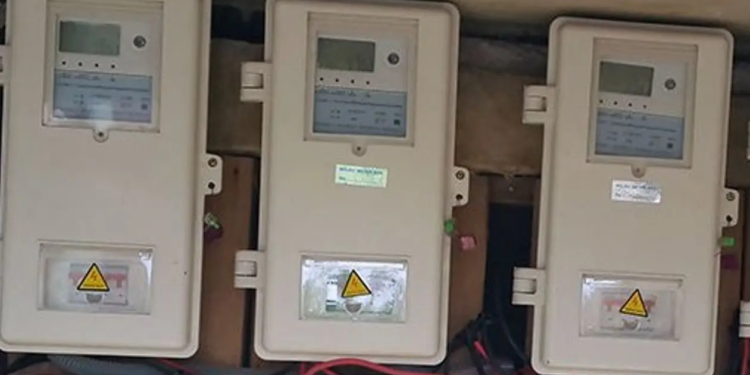There are strong indications that the first and second phases of the National Mass Metering Programme (NMMP) of the federal government have been derailed as paucity of funds threatens its execution, LEADERSHIP has learnt.
Equally, indigenous meter assemblers and producers are at a crossroads following the inability of power distribution companies (DisCos) to procure meters, thus threatening sustenance of its 30 million yearly meter production capacity.
Six million meters are scheduled to be deployed nationwide in the first and second quarters of this year to reduce the number of unmetered electricity consumers in Nigeria, the federal government has said.
Disclosing this in a December 2022 document on the review of the performance of the power sector/Nigerian Electricity Supply Industry (NESI) under the current administration, the federal government said it had successfully executed a metering initiative post-privatisation with one million meters rolled out in the preliminary phase of the National Mass Metering Programme, referred to as Phase Zero.
The document, which emanated from the Federal Ministry of Power in Abuja, noted that the Central Bank of Nigeria (CBN) and the Nigerian Electricity Regulatory Commission (NERC) were fundamental in designing and implementing this programme.
Recall that in June 2022, the NERC chairman had said that plans were ongoing to install four million meters under the first phase of the NMMP by August 2022.
That phase was later put on hold following allegations of fraud by the Central Bank of Nigeria against some of the Meter Asset Providers, MAPs.
The CBN, on July 20, asked the Federal High Court in Lokoja, Kogi State, to freeze accounts belonging to 157 MAPs for allegedly diverting funds meant for the procurement of prepaid meters.
The NMMP is an initiative of the Nigerian Electricity Regulatory Commission, NERC, in conjunction with the Presidential Power Task Force. The initiative was launched in August 2020 to allow the CBN to fund the acquisition of meters on behalf of DisCos by paying directly to the MAPs
The minister of power, Abubakar Aliyu, had equally spoken on the issue.
However, in an exclusive chat with LEADERSHIP in Lagos, the chief executive officer (CEO), MOJEC International, Ms. Abdul Chantelle, raised serious concerns about the ability of DisCos to key into the exercise to fully execute the mandate of the initiative.
Abdul said under Phase Zero of the metering project, only about 900,000 meters were deployed, with her company providing 50 per cent of the numbers.
She said local producers and assemblers have an estimated 30 million capacity, which is facing challenges as all produced meters are lying fallow because the DisCos lack the finance to procure them for deployment.
According to her, MOJEC has a production capacity of about four million meters per annum, but most of the meters produced are abandoned in the warehouses because there is no order from DisCos.
As the meter deployment of government runs into a hitch, Abdul said, her company is planning to renew advocacy and national awareness on the Meter Asset Provider (MAP) initiative.
She informed LEADERSHIP that MOJEC would roll out a national awareness programme to sensitise the public on the benefits of keying into the MAP exercise to ensure success of the Mass Metering Programme.
LEADERSHIP reports that, in a renewed bid to ensure that electricity customers only pay for what they actually consume, the NERC endorsed a regulation that provides for the supply, installation and maintenance of end-user meters by other parties approved by the commission.
The regulation was expected to fast-track a closure of the metering gap and encourages the development of independent and competitive meter services in the electricity industry.
The Meter Asset Provider (MAP) Regulation (Regulation No. NERC/R/112), which became effective on April 3, 2018, introduced meter asset providers as a new set of service providers in Nigeria Electricity Supply Industry.
As assets with a technically useful life of 10-15 years, the regulation provides for the third-party financing of meters under a permit issued by the Commission, and amortisation over a period of 10 years.
The DisCos, in line with their licensing terms and conditions, are obliged to achieve their metering targets as set by the Commission under the new regulation.
The contracting of Meter Asset Providers shall be through an open, transparent and competitive bid process thus ensuring that meters are provided at a least cost to electricity customers.
Abdul explained that, under the new MAP regulation, customer classes shall be amended to ensure that customers only pay for meters when a meter is physically installed in their premises.
The electricity bill of customers provided with a meter under the new regulatory framework shall comprise of two parts – energy charge and metering service charge.
Based on the terms, the payment of metering service charge will be removed from the customer electricity bill upon the full amortisation of the meter asset over its useful life, while all faulty meters are expected to be repaired or replaced free of charge within two working days, except in instances where it is established that the customer is responsible for the damaged meter.
In pursuit of promoting local content, the new MAP regulation mandates the investors to acquire a minimum of 30 per cent of their metering volume from indigenous meter manufacturers. This local content threshold may be adjusted by the Commission from time to time in line with the verified manufacturing volume of local manufacturers.
The eleven DisCos are expected to, within 120 days from the effective date of the regulation, engage the services of MAPs towards the achievement of their three-year metering targets prescribed by the commission.



